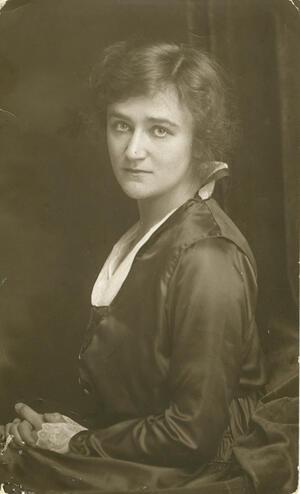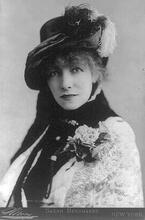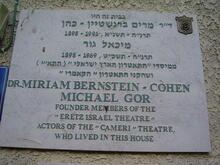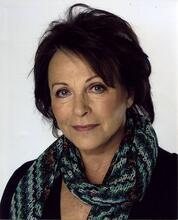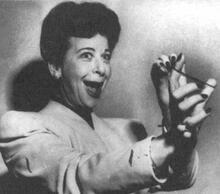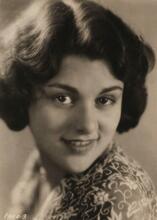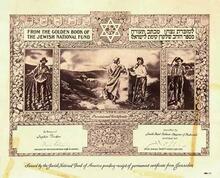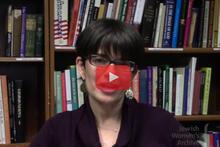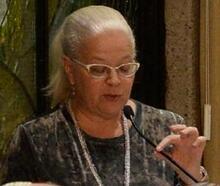Salka Viertel
Salka Viertel was an influential actress, writer, and organizer of Jewish European immigrants in Hollywood. In 1908 Salka joined the Viennese company Neue Wiener Bühne as a principal actress. In 1916, she met Viennese writer and director Berthold Viertel, who left his wife to marry her in 1918. In 1923, the Viertels founded Die Truppe, an Expressionist theater company. In 1928, the Viertels left Berlin for Hollywood, where Viertel co-wrote the screenplays for several Greta Garbo films. Viertel's California home welcomed émigrés such as Thomas and Heinrich Mann, Bertolt Brecht, Fred Zinnemann, Schoenberg, Reinhardt, Dieterle, and Murnau. Viertel established the European Film Fund, a Hollywood endeavor to rescue Jews and others in danger. Unfortunately, Viertel’s salon dissolved under the communist inquisition of the Hollywood film industry.
Early Life and Family
Salka Viertel was born Salomea Sara Steuermann on June 15, 1889, in Galicia (then part of Austria-Hungary, now Poland/Ukraine). Her father, Josef Steuermann, was the first Jewish mayor of Sambor. He and his wife, Augusta, had three other children: Rose, Eduard, and Siegmund.
Salka studied Latin, Greek, and German at school, learned French from her governess, and spoke Polish and Ukrainian at home. At an early age she discovered a passion for theater. She worked as an actress in Pressburg (Pozsony), Teplitz-Schönau (Teplice) and Zurich before moving to Berlin to join Max Reinhardt’s Deutsches Theater. It was here that she met Ernst Lubitsch and F. W. Murnau, then actors in Reinhardt’s ensemble. Her brother Eduard studied with Arnold Schoenberg; as a solo pianist he premiered the composer’s Pierrot lunaire.
Performance Career and Screenwriting
In 1908 Salka joined the Viennese company Neue Wiener Bühne as a principal actress. While playing Vassilisa in a 1916 production of Maxim Gorky’s Lower Depths, she met the Viennese writer and director Berthold Viertel (1885–1953), who left his wife to marry her in 1918. After World War I Berthold was an influential theater and film director in Dresden, Dusseldorf and Berlin. In 1923 the Viertels founded Die Truppe, an Expressionist theater company and innovative school that produced plays by Shakespeare, Friedrich von Schiller and Henrik Ibsen, and employed Georg Grosz, Friedrich Kiesler and Friedl Dicker Brandeis as set designers. During Salka’s years in the avant-garde theater, the Viertels had three sons, Hans (b. 1918), Peter (b. 1920), and Thomas (b. 1915). Peter went on to write screen plays, dramas, and novels, notably White Hunter, Black Heart.
In 1928 Berthold was invited to write the screenplay for Murnau’s second American film, Four Devils (1928). Bankrupted by the artistically successful yet financially challenged Die Truppe, the Viertels left Berlin for Hollywood, where Berthold worked for Fox, Paramount, and Warner Bros. In addition to writing the script for Murnau’s Four Devils and City Girl, he directed such Hollywood films as Seven Faces and The One Woman Idea (both 1929) and The Man from Yesterday (1932). Salka had minor roles in Seven Faces and in three German-language films: Die heilige Flamme (The Sacred Flame, 1931), which Berthold co-directed with William Dieterle; Dieterle’s Die Maske fällt (1930); and a version of Anna Christie starring Greta Garbo (1931). Salka had met Garbo at a party at Ernst Lubitsch’s home in 1929 and the two were instant friends; after their first meeting, it was said, the path to a Hollywood production with Garbo was through collaboration with Salka Viertel. A brilliant teacher of elocution, she helped Garbo feel comfortable speaking English—acquaintances claimed that Garbo’s accent was identical to her friend’s. Garbo encouraged Salka, who was now over forty, to shift her focus from acting to writing. Viertel co-wrote the screenplays for Garbo’s films Queen Christina (1933), The Painted Veil (1934), Anna Karenina (1935), Conquest (1937) and Two-Faced Woman (1941), as well as for the Jean Negulesco film Deep Valley (1947).
Life in California and Communist Suspicions
While Salka remained in Santa Monica with their sons, Berthold, less at home and now less successful in California than his wife, traveled often to New York and abroad for work in film and theater. Disinclined to return to the United States, he remained in Berlin until the burning of the Reichstag in 1933; he then joined the already sizeable German émigré community in London and met with success directing the film Little Friend (1934), a thriller written with his friend and disciple Christopher Isherwood. Berthold returned to Hollywood in 1938.
The Viertels had gone to California intending to stay only a few years, but with the onset of war in Europe, Santa Monica began to seem like home. As she recounted in her memoir The Kindness of Strangers (1969), Salka Viertel readily adapted to the climate and the culture. On Sunday afternoons her home at 165 Mabery Road welcomed such émigrés as Thomas and Heinrich Mann, Bertolt Brecht, Fred Zinnemann, Schoenberg, Reinhardt, Dieterle and Murnau. An outpost of Mitteleuropa, with its conversational tone and home-cooked meals, Viertel’s salon attracted refugees with similar backgrounds. Its hostess’s reputation for hospitality reached talented individuals desperate to flee Europe. In response to letters of appeal, she encouraged colleagues at MGM to sign affidavits for writers and artists stranded in Europe, among them Leonhard Frank, Walter Mehring and Alfred Döblin. Her efforts led to the establishment of the European Film Fund, a Hollywood endeavor to rescue Jews and others in danger.
In 1942 Salka Viertel was put on an FBI “Watch List” and in 1951 she was given an entry in the “Communist Index.” Members of the Free Germany Committee, including Thomas Mann and Brecht, met at her house in 1943 to compose a statement that the German people be considered not the architects of Nazism but its first victims. This nostalgia for German culture, blended with horror at what was happening in Europe, characterized the ambivalence felt by Viertel and her circle.
Salka’s brother Siegmund (known as Dusko) had died under the German occupation, but her mother was able to leave for the United States in 1941. Her sister, Rose, who had had a successful stage career, narrowly escaped the war, fleeing to South America with her husband, the theater director Joseph Gielen, and their son, Michael, who would become a conductor. In 1943 Viertel lost her screenwriting job at MGM. Garbo, who was growing more reclusive, had turned down leading roles in scripts co-authored by Viertel. The Viertels’ marriage, strained by each partner’s extramarital affairs and Berthold’s travels, ended in 1944. He returned to Europe for good in 1949 and worked in Vienna and Berlin and for the Salzburg Festival; he died in Vienna in 1953.
Salka’s salon dissolved under the inquisition of the Hollywood film industry. The country that had been a safe haven was now a place of persecution and many of her friends left their adopted homeland for Europe. Her application for a passport in order to visit the dying Berthold was denied by the State Department in 1953, on the grounds that she had been a Communist sympathizer. Salka Viertel did eventually leave her beloved Pacific Ocean. She died in Switzerland in 1978.
Excerpted with permission from Jewish Women and Their Salons: The Power of Conversation (New York: The Jewish Museum. New Haven: Yale University Press, 2005. © The Jewish Museum and Yale University Press.
Horak, Jan-Christopher. "Sauerkraut & Sausages with a Little Goulash: Germans in Hollywood, 1927." Film History 17.2-3 (2005): 241-60.
LeMasters, Carol. “Breaking ‘the Code.’” The Gay & Lesbian Review Worldwide, April 30, 2001: 15.
Prager, Katharina, and Vanessa Hannesschläger. "Gendered Lives in Anticipation of a Biographer?" Tijdschrift voor Genderstudies 19.3 (2016): 337-53.

